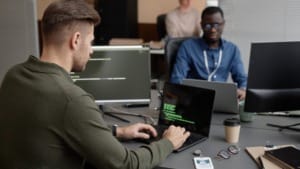Women in tech, and the organizations that empower them
A culture reset is needed to change the game for women in tech

Although the world has come a long way from the notion that sees women as the fairer sex, glass ceilings still do exist in the workforce, especially so in male-dominated industries like technology. We explore how three women-led initiatives have been exemplary in rewriting these narratives as they pave the way for women to achieve success in tech.
Table Of Content
TechLadies
Founded in 2016 by Elisha Tan, TechLadies is a community-led initiative for women across Asia to network, skill-up, and progress in the tech industry. Since its inception, the community has grown its membership to over 4000 members in Asia. Techladies have taught more than 500 women in Singapore and Malaysia how to code, and as a result, twelve participants have successfully transitioned their careers into technical roles.
To ensure that their cause caters to women learners from all levels of technical skill, TechLadies have several approaches/programmes that interested participants can consider.
In particular, women who are seriously thinking about transitioning to the tech-industry can consider the TechLadies Bootcamp as it is one of the major programmes that TechLadies has, and it is currently in their seventh run in 2021.
The accelerated learning programme brings participants with basic programming background through a 12- to 15-week learning journey towards becoming professional programmers. Participants will be guided by a team of industry experts across various tech fields (eg Software Engineers, Developers, UI/UX Designers) who will lead and coach them throughout the programme to create products for non-profit organizations. To name a few, some of the non-profit organizations that have benefitted from the TechLadies Bootcamp include Touch Community Services, Mountbatten Vocational School, and Asian Film Archive.
More recently, TechLadies have introduced the TechLadies Mentorship programme which runs for 12 weeks and focused more on providing dedicated mentoring in the form of personal career guidance from industry experts. The four fields that are being covered in the TechLadies Mentorship programmer are Software Engineering, UI/UX Design, Data Science/Engineering/Analysis, and Product Management.
Given the mentorship nature of the programme, ideal participants would be women mentees with existing careers in the abovementioned roles who are looking into career progression in their verticals or women with existing knowledge/skills (fresh graduates included) seeking employment opportunities in the above domains. The TechLadies Mentorship is on its third run in 2021.
Applications for both the TechLadies Bootcamp and TechLadies Mentorship programme for 2021 are opened, interested participants can look forward to participate and find out more about the programme structure meanwhile via the official website to understand more on the commitments needed, tasks involved, and also more information on other available TechLadies programmes.
The Codette Project
The Codette Project is another women-led initiative founded by Nurul Jihadah Hussain in 2015, that prioritises underrepresented groups in tech, especially minority/Muslim women and girls. With the aim to provide sustainable economic impact, the non-profit offers a platform for minority women to have an awareness and gain a foothold in the tech industry via tech-skills development, community building and redefining narratives of success by highlighting stories that include minority/Muslim women.
The programmes that The Codette Project have delivered include having tech classes and workshops in coding, data analytics, and user experience (UX), as well as the Tech-for-Good women-only hackathon.
Recognizing the economical impact that the pandemic has on people’s incomes and livelihoods, The Codette Project has also launched the Codette Cares 2020 project which aims to provide beneficiaries with funding support as well as a year-long mentorship programme to help them navigate through their goals within the tech-arena. The Codette Cares 2020 project has benefitted more than ten individuals who are either students pursuing tech-related fields or business-owners helmed by minority/Muslim women.
Throughout 2020 and the past years, The Codette Project has also teamed up with major tech players and organizations such as Deloitte, and Facebook to deliver regular online workshops in resume and interview skills as well as preparations. Other engaging social media initiatives include their Conversations with Codette which ran between late October to November where participants were able to tune in to live conversations over Instagram with The Codette Project team members who are all experts in their own fields.
To date, The Codette Project has collectively reached out to over 430 participants and delivered over 20 events and workshops. Ongoing efforts by the team include working on holding a panel group discussion with 16-25-year-olds to understand better the kind of support that would help minority/Muslim women to apply and pursue tertiary education.
For all the efforts that The Codette Project has done, Ms Nurul features in the debut list of 100 Women in Tech in Singapore which celebrates community advocates that play a pivotal role in supporting and pushing for a more diverse tech arena as well as boldening the role of women in the industry.
Girls In Tech
Girls In Tech is a nonprofit organization founded in 2007 by Adriana Gascoigne, with a worldwide reach that spans over 50 chapters and more than 60,000 members across the globe aiming to eliminate the gender gap in the tech industry.
Girls In Tech provide a wide array of programmes such as bootcamps, international mentorship, events (conferences, webinars, hackathons), as well as a jobs board for their members. Women who are keen on being updated on these programmes need only sign-up for a free membership and they will be regularly kept updated on future events.
Particularly for the mentorship programme, Girls In Tech have designed a programme that is comprehensive, well-structured and goes beyond the usual consultation sessions between mentor and mentee. Mentees are required to attend lectures conducted by women tech-leaders who not only guide them through a checklist of actions that would help them curate and achieve their goals, but also engage them in activities that involve values assessment, networking, and creating their personal brand. These lectures are richly supplemented by a repository of resources such as reading materials and activity sheets commonly used in career guidance.
During the programme on-boarding, mentees are prepped on the commitment required to achieve a successful mentorship experience and this includes keeping up with the activities that are to be done after every lecture, and a check-in with their assigned mentors prior to the next lecture.
In summary, socially-conscious initiatives brought about by such organizations are critical in supporting the narrative of technology as an enabler in levelling the field for women and underrepresented communities to be successful in the industry. Through sustained efforts, it is with hope that a multiplier effect catalysed by such organizations can support the push for diversity in tech for generations to come.
















